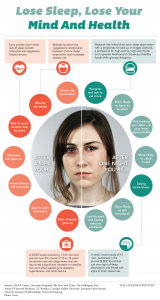 Proper Sleep is one of the most important yet under emphasized aspects of our health. Just like food and water, sleep is actually a key nutrient our body needs.
Proper Sleep is one of the most important yet under emphasized aspects of our health. Just like food and water, sleep is actually a key nutrient our body needs.How do we get better sleep? We have to optimize and regulate our Circadian Rhythm.
Our Circadian Rhythm is what regulates our wake and sleep cycles. We have specific hormones that are released at certain times of the day. When our routines are get interrupted, this disrupts our circadian rhythm and ultimately our sleep duration and quality.
So to optimize our sleep we must address our Night AND Morning Routines.
Morning Tips:
- Get exposed to light as soon as possible. Natural light is optimal, so open those shades & turn on the lights!
- Avoid multiple alarms & Snooze button: the extra 5-10 minutes of laying there restless doesn’t make you feel better in the long run. Just get up & get going!
- Morning movement: Doing physical activity boosts blood flow to the body & brain, increases energy & is a great ritual to get the day started. This could be structured exercise, mobility flows, stretching, yoga, walking etc. I personally set aside 20-30 min first thing for some cardio & stretching.
- Schedule exercise: Exercise has so man benefits, including boosting energy, cognitive function & hormone regulation. Timing & amount is key; too much can spike cortisol & leave you feel “wired & tired” at night. Exercising in the morning/daytime vs. at night has been shown to help with sleep.
- Avoid multiple stimulants and naps to “get you through” the day. Caffeine is acceptable before 2pm, since it can stay in the bloodstream for 8-10hrs! It’s important to know your body & how much caffeine/stimulants you can handle.
Night-time Tips:
- Create a Technology Curfew. Create a Rule (set an alarm if need be!) of when you’re “off” from technology. A great goal: 2 hrs before bed off the computer/tablet & 60 minutes no phone.
- Use a blue-light filter on your gadgets in the evenings. Fluxx is a free software for devices & there are ton of free apps for phones. Blue light raises cortisol & suppress Melatonin, a key hormone that regulates our circadian rhythm. Melatonin relaxes the body & primes us for sleep.
- Cut out caffeine & stimulants by 2 p.m.
- Aim to finish your last meal 2-3 hours before bed.
- Avoid exercising late in the evening/night. It is recommended to exercise during the day, or at least 3 hours before bed. Light movement and physical activity, such as walking, yoga or stretching, have been shown to help relax the body and improve sleep.
- Avoid stimulating & heavy foods in the evening: high sugar, processed & packaged foods, chocolate etc.
- Stick to a bedtime schedule. Aim to go to bed/rise within an hour every day of the week. Avoid extreme sleeping in on the weekends.
- If possible, be asleep by 11pm. The deepest most healing sleep occurs between 10p-2a. The earlier you can get sleeping, the better!
- Create a night-time “relaxing” routing to calm down your nervous system & body. Find what works for you; meditation, prayer, journaling, reading, a bath/shower, etc.
- Set your bedroom to a cool temperature (under 70F).
- Limit light exposure in your bedroom with dark/black out curtains or shades.
- Using dimming lights & limit bright light at night.
- Consider using calming high quality essential oils, like lavender, copaiba, vetiver & cedarwood.
All of these lifestyle habits can contribute to better sleep, thus helping you to your best health!
